As all the world knows Italy was the first western country to be harshly hit by the pandemic. It is now facing a challenge that could soon affect other nations: the vaccination of migrants.
In the Boot that we call Italy there are roughly six million transient workers. As of yet there is no plan in pace to vaccinate this poorer social strata coming mainly from Africa and Eastern Europe.
“No one directly tells them ‘you are excluded,’ but at the same time no one does anything to prove otherwise” explains Dr. Salvatore Geraci, a member of the Immigration Health Bureau, who at the beginning of February sent a letter to the Government pointing out that migrants should not be forgotten by the vaccination campaign, which is now mainly focused on native citizens.
“The risk is to repeat last April’s attitude towards them. At that time the government said ‘stay home’, but many migrants did not have a house or the resources to survive without going out. No one cared except solidarity associations like ours, but it was not enough to avoid a social disaster” stresses Geraci, who believes “that forgetting migrants might undermine the campaign’s efficacy”.
Indeed, current data reveals how the immunity coming from Pfizer, AstraZeneca and so on is not permanent, as it may last less than one year. Hence there’s the need to have the largest possible percentage of society immunized to save the whole “herd”.
As soon as the first categories—health care workers and the elderly get vaccinated, this issue will break out and then we will see how much the claims of certain government officials of solidarity with migrants are real or simply propaganda.
Walking through the migrants populated areas of Barriera or Falchera in Turin there’s few will to talk about the vaccine and the virus amidst the foreigners living there. Some believe it is fake news and simply refuse to talk. But however the feelings, most do not expect to be helped,, based on past experiences.
“For the Government we’re not part of this state so we should have expected that our health wouldn’t have been a priority in the agenda” states Aziz, an itinerant merchant who came to Italy 30 years ago from Nigeria, and agreed to talk to the Star-Revue “I would love that after a life in this country serving local people in Porta Palazzo (an open market in Barriera) someone would have recognized the right for me to be freed from this plague”.
Instead he will probably have to wait longer than his Italian neighbors and colleagues, due to a tacit political will to vaccinate Italians first, “because migrants don’t vote,” comments Aziz.
This political will is evident in the publicity of the vaccination campaign, that puts native Italians ahead of other residents . Such an awful paradigm should be smashed, according to progressive politicians such as Marco Grimaldi, a regional councilman in Piedmont for the Free Equal Green Party.
“Everyone agrees that big pharmas like Biontech made incredible efforts to produce the vaccine in a brief time, but above all we should avoid a wild privatization of a common good like the vaccine.
Hence we must abolish any sort of patent or earning as regards vaccines, because otherwise our cities, nations and even our world will be divided into two halves: the richer immunized and the poorer not. It will be a mess” he states.
Asked if this means that an abolition of private property is required as regards health he smiles, saying “We need health socialism.”
—
Author
-

Dario Pio Muccilli is the Star-Revue’s Italian correspondent, based in Turin. Email him at muccillidariopio@gmail.com
View all posts
Dario Pio Muccilli is the Star-Revue’s Italian correspondent, based in Turin. Email him at muccillidariopio@gmail.com










